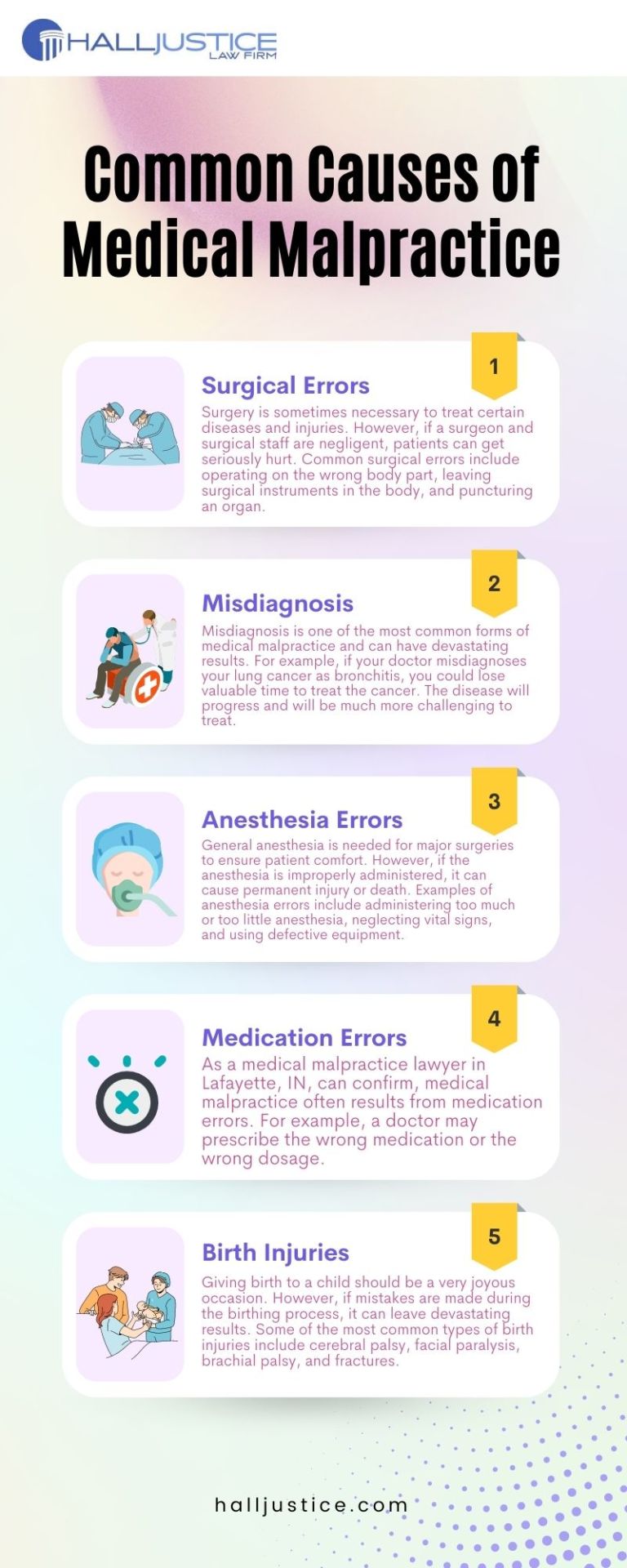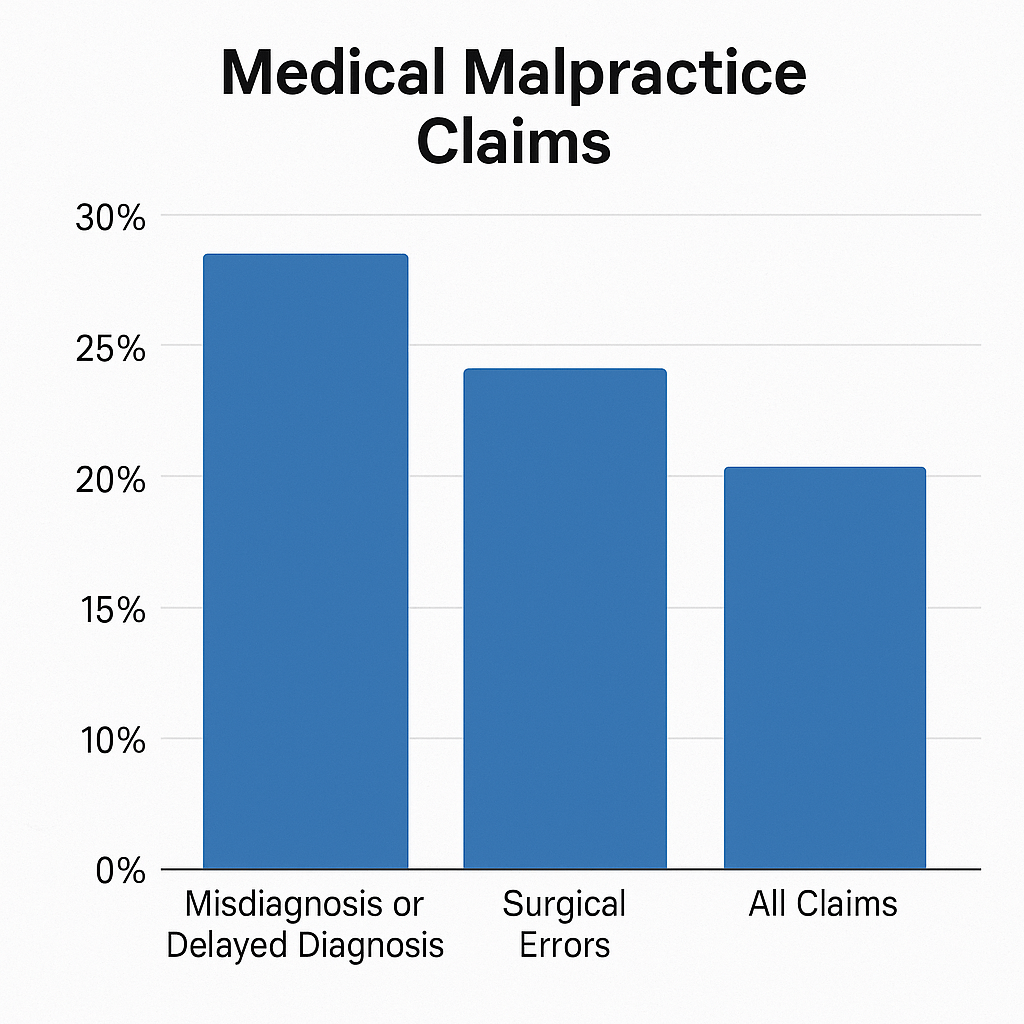Menu

Lafayette Medical Malpractice Lawyer


Your Advocate After A Medical Injury
Every medical malpractice case is different, so it is important not to make assumptions about the potential strengths and weaknesses of your situation until you’ve spoken with our Lafayette, IN medical malpractice lawyer. This is especially pressing for those patients who are unsure of whether they have cause to file legal action because they are unsure of whether they can prove their suspicions that their harm resulted from substandard medical care.
Types Of Medical Malpractice Cases We Handle
In a nutshell, medical malpractice occurs when a medical professional or facility provides substandard care to a patient and that patient suffers harm as a result. Substandard care is a somewhat fluid concept, as it is applied differently in each case. At its most basic, substandard care is defined as care that does not meet the standards that would be upheld by a reasonably competent provider who was faced with similar circumstances.
Medical malpractice, while rare considering the extensive training and expertise of healthcare professionals, remains a significant concern in the medical field. This form of professional negligence arises when a healthcare provider, such as a doctor or nurse, deviates from the standards of their profession, leading to patient harm. Some of the most prevalent causes of medical malpractice include:
Surgical Errors
Invasive procedures are often vital for treating various health conditions, but they carry inherent risks. Surgical errors are a prime example of medical malpractice, where the consequences can be severe. Common instances of surgical negligence include performing a procedure on the wrong body part, accidentally leaving surgical instruments inside the patient, and unintentional organ damage during the operation. These errors can result from a range of factors, including poor preoperative planning, miscommunication among the surgical team, and surgeon fatigue.
Misdiagnosis Or Delayed Diagnosis
This is among the leading causes of medical malpractice claims. When a healthcare provider fails to accurately diagnose a serious health condition promptly, the patient’s condition may deteriorate, potentially leading to irreversible harm or even wrongful death. For example, mistaking lung cancer for a less severe condition like bronchitis can delay critical treatment, allowing the cancer to progress to more advanced, less treatable stages. Factors contributing to misdiagnosis include failure to recognize symptoms, inadequate medical history evaluation, and errors in lab test interpretation.
Anesthesia Errors
Anesthesia is necessary for pain management during surgical procedures. However, errors in its administration can have catastrophic outcomes, including permanent injury or death. Anesthesia mistakes can involve giving too much or too little anesthesia, ignoring patient vital signs, and using malfunctioning equipment. These errors are often due to factors like inadequate preoperative assessment of the patient, poor communication among the medical team, and lack of proper monitoring during surgery.
Medication Errors
Incorrect medication prescriptions or dosages constitute a significant portion of medical malpractice cases. These errors can occur at various stages, from prescribing to dispensing and administering medication. They can result from a doctor prescribing the wrong medication or dosage, a pharmacist dispensing the incorrect drug, or a nurse administering medication improperly. Causes of medication errors include miscommunication, inadequate patient information, and confusion caused by similar drug names.
Birth Injuries
Childbirth, while a momentous occasion, can be complicated by medical errors that result in birth injuries. These injuries can range from mild to severe, including conditions like cerebral palsy, facial paralysis, brachial palsy, and fractures. Birth injuries can occur due to several reasons, such as improper use of delivery tools, failure to monitor the baby’s vital signs adequately, or neglecting signs of fetal distress. These injuries can have long-lasting or permanent effects on the child’s health and development.
Understanding these common causes of medical malpractice is vital for both healthcare professionals, to prevent such occurrences, and patients, to be informed and vigilant about their healthcare.
Lafayette Medical Malpractice Infographic

Types Of Damages Recoverable In A Medical Malpractice Claim
In the challenging scope of medical malpractice claims, understanding the various types of financial compensation available is vital for victims seeking justice. These damages, categorized based on their nature and calculation methods, form the foundation of a compensation claim. Engaging with our proficient Lafayette medical malpractice lawyer is pivotal to effectively handling legalities, optimizing your chances of a favorable outcome, and winning your case.
General Damages
General damages in a personal injury cases refer to compensatory damages that are not easily quantifiable in monetary terms. They represent the more intangible, non-economic losses suffered by a victim due to medical negligence. Calculating these damages typically involves complicated estimations, relying heavily on professional testimonies and extensive documentation. Common types of general damages include:
- Physical Pain and Suffering. This covers the actual physical discomfort and pain endured by the victim as a result of the malpractice.
- Mental Anguish. Often, victims suffer psychological impacts such as stress, anxiety, depression, or trauma, which are encompassed under mental suffering.
- Diminished Quality of Life. This addresses the loss of enjoyment in life due to disabilities, chronic pain, or other lasting effects of the medical error.
- Future Earnings Loss. If the malpractice leads to a reduced capacity to work or permanent disability, compensation for future earnings that are potentially lost or diminished is considered.
Law firms specializing in medical malpractice, like the Hall-Justice Law Firm, offer essential guidance in documenting these damages and effectively presenting them in a legal claim.
Special Damages
Special damages, in contrast, are more straightforward to calculate as they correspond to direct, economic losses incurred by the victim. These include:
- Medical Expenses. One of the most concrete forms of special damages, it covers all medical bills and healthcare costs directly resulting from the malpractice. Victims must meticulously collect and present all relevant bills and receipts.
- Lost Wages. Compensation for lost income due to time off work for recovery or treatment is included here. Calculating this damage is relatively straightforward, especially for salaried employees, as it involves assessing past earnings and hours worked.
The process of quantifying special damages typically involves a detailed examination of financial records, pay stubs, and medical invoices. Maintaining accurate records and sharing these with our medical malpractice attorney is important for substantiating these claims.
Dealing with a medical malpractice claim involves understanding these categories of damages and effectively proving them in a legal context. This underscores the importance of engaging with knowledgeable legal professionals who can guide victims through the details of the claim process, from gathering necessary documentation to arguing the case in court.
Punitive Damages
Punitive damages are only awarded in cases where it can be proven that the doctor at fault knowingly acted in a way that caused harm to the patient. They must have blatantly disregarded safety, such as botching a surgery, forcing the patient to need future treatment.
Wrongful Death
Family members of a loved one who died as a result of medical malpractice may also be entitled to damages. Financial compensation can cover the victim’s final expenses, as well as provide support for the family’s future. Factors such as work history and spending habits will be examined to determine a fair outcome in a wrongful death lawsuit.
Medical malpractice claims can be difficult to handle if you don’t have the knowledge and experience that our firm does. To receive financial compensation from a medical malpractice claim, you must prove that the malpractice was the cause of the harm that you suffered. You will also need reasonable documentation and evidence to reach an approximate monetary figure.
Lafayette Medical Malpractice Statistics
According to multiple studies, medical mistakes may be responsible for approximately 250,000 deaths in the United States each year, making it one of the leading causes of death. Misdiagnosis or delayed diagnosis accounts for nearly one-third of medical malpractice claims filed. Surgical errors make up 25 percent of all claims filed.
If you’ve suffered an injury due to hospital negligence, contact our medical malpractice lawyer to discuss your legal options. Indiana law allows malpractice victims to pursue damages for medical expenses, loss of income, pain and suffering, disability, and more.

Medical Malpractice FAQs
Our firm is dedicated to guiding victims through the complicated process of medical malpractice claims, helping them understand their rights and the types of damages they can pursue. The following is a guide to some of the most common questions our Indiana medical malpractice attorney gets from clients. For more tailored guidance, we recommend setting up a consultation with us.
Are Medical Malpractice And Medical Errors The Same Thing?
Medical errors are a kind of medical malpractice. Not all medical malpractice involves medical errors, but it is safe to say that many, many instances of medical malpractice involve errors. Medical malpractice occurs whenever substandard care causes the injury of a patient. Many medical errors are injurious but other circumstances qualify as medical malpractice, too. For example, if a patient arrives in an Emergency Department and the facility refuses to treat them for professionally unacceptable reasons, any harm that results from that failure to treat them could be considered grounds for a medical malpractice lawsuit.
Is Medical Malpractice Common?
As our skilled Lafayette medical malpractice lawyer can confirm, medical malpractice is mind-bogglingly common. A now-famous study released by researchers at the Johns Hopkins University School of Medicine determined that medical errors alone are the third-leading cause of death in the U.S. This statistic says nothing about the millions of non-fatal (but still injurious) medical errors and instances of medical malpractice that occur annually as well.
How Do I Know If I Have A Case?
Please understand that you do not need to know with any certainty whether you have a cause for legal action before you make a consultation appointment with our firm. It is very common to suspect that your care team or a particular medical facility has harmed you as a result of substandard care without being able to prove such suspicions immediately. Medical professionals are not always aware of their missteps and those who are, aren’t always willing to admit to them freely.
What If I’ve Already Been Offered A Settlement?
If the settlement is fairly valued, it may be worth considering. If it isn’t, you’ll need to know how unfairly it is valued and what rights you’re being asked to sign away by potentially accepting the settlement.
How Can A Lawyer Help Me?
You have certain rights as a medical patient. You are entitled to the standard of medical care. Yet, you may leave operations or treatments worse off than you were before. If you suffered negligent care from a provider, you could qualify for a medical malpractice claim. Our personal injury lawyer can help you build a strong case and sue providers for medical malpractice.
- We Can Start Investigating. You may be unsure if your injuries are a result of malpractice. This is normal. Things can happen so fast that it can be hard for you to remember what occurred. You could’ve been under general anesthesia for an operation. In this case, you likely can’t remember anything that happened at all. Our malpractice lawyer can help put together the pieces of the puzzle. Different situations have different possibilities of evidence. We may read medical records and ask an outside doctor about proper treatment. We could ask other witnesses of the scene about what occurred.
- We Can Initiate The Legal Process. If our personal injury lawyer concludes that you suffered from medical malpractice, we can go ahead and start the legal proceedings. We can file all the proper paperwork and continue to strengthen the argument for your case. Negotiations can be huge at this point. A lot of the time, you can get your compensation through a settlement. Our lawyer can be a key negotiator to stand up for your rights and get you what you need. Sometimes, the lawsuit does get taken to court. In that case, you can trust our personal injury lawyer to guide you on the trial proceedings. We can gather the evidence needed to present a thorough argument to the jury.
Let Us Answer Your Questions
Legal proceedings can be exhausting for anyone. This can be doubly so for someone dealing with prolonged injuries. Know that the Hall-Justice Law Firm is there for you. Our personal injury attorney can answer any questions you have about medical malpractice. You don’t have to go into the process blind. Leaving the hard work to a professional can help. Contact us today to address your concerns in a safe space.
Hall-Justice Law Firm LLC, Medical Malpractice Lawyer
200 Ferry St Suite A, Lafayette, IN 47901
Enlist Skilled Legal Assistance
Successfully pursuing medical malpractice cases demands specialized legal knowledge. Making the choice of a competent personal injury attorney essential. Our legal team will adeptly handle negotiations with insurance companies, aiming to alleviate your stress throughout the process. Whether it’s general damages that address the intangible aspects of suffering or special damages covering direct financial losses, our team at Hall-Justice Law Firm is committed to providing thorough, empathetic, and effective legal representation so that our clients receive the justice and compensation they deserve. Speak with Susannah Hall-Justice, our Lafayette medical malpractice lawyer, today for a free case review.


EXCELLENTTrustindex verifies that the original source of the review is Google. Justice was very informative & kind & went above & beyond for me in every way she could . I highly recommend this attorney!!!!Posted onTrustindex verifies that the original source of the review is Google. Had an initial consult with the paralegal this morning. She was so polite, and very helpful. Listened, took my info and made the process very easy, in an area where I have a tough time finding attorney's. Thank YouPosted onTrustindex verifies that the original source of the review is Google. Mrs Hall did a great job in helping me get the best outcome for my case. I highly recommend her services.Posted onTrustindex verifies that the original source of the review is Google. I was fortunate to receive help from Susannah and her team. Susannah is a highly knowledgeable expert in her field. Although my requests was relatively straightforward for such an experienced professional, Susannah and her team provided me with outstanding support and answered all of my questions. I recommend discussing your specific situation with Susannah—even if it feels stressful—because she is excellent at analyzing circumstances and presenting clear options and potential actions. I have no doubt that Susannah and her team have the expertise to provide the best insight and guidance in their field.Posted onTrustindex verifies that the original source of the review is Google. Process went smoothlyPosted onTrustindex verifies that the original source of the review is Google. Susannah Hall-Justice is an amazing attorney! She was on top of things every step of the way and I am very thankful for her!Posted onTrustindex verifies that the original source of the review is Google. I am currently a client of hers. I do get nervous going to court or just simply meeting with her as my lawyer because I never had to be in a situation that required me to need a lawyer! I feel safe with Ms. Hall-Justice because you can just tell she has your best interest! She listens, observes and make sure you are heard! I am praying to God I don’t have to look like what I’m going through because it’s stressful and I just want to go back to my regular life with my children!Posted onTrustindex verifies that the original source of the review is Google. This attorney is definitely a credit to her craft! She is very personable and never talks down to a client. She makes a person feel like he/she is actually part of what's going on. She negotiated with the prosecutor and i was offered EVERYTHING that I had hoped for and even more! I would definitely hire her again and i highly recommend that you hire her and trust her in what is often a very vulnerable and confusing time.Posted onTrustindex verifies that the original source of the review is Google. When we needed a Lafayette attorney to represent us for various charges, Susannah was all we could have hoped for. She had several charges dropped immediately and the remaining minor charges diverted for good behavior. After two months of good behavior, all charges were dismissed. Susannah and her assistant Erica were responsive, supportive and above all very effective. All at very reasonable rates. I have worked as a criminal defense lawyer in the past and I was very impressed.Posted onTrustindex verifies that the original source of the review is Google. Impressive and refreshing. I called Susannah’s office first thing in the morning to inquire about a minor legal service and left my contact information with her assistant. Susannah personally called me back only a short while later despite how busy she undoubtedly is. It turned out that the legal opinion I required had to be from a practicing attorney in a different state so we didn’t go forward. Still, the fact that she personally returned my call, and was genuinely pleasant and attentive, substantiates her very positive and personal reviews. Not to stray into the negative but what a breath of fresh air compared to most of the attorneys with whom I’ve spoken in this area - routinely terse, rude and bumptious. This (Hall-Justice) is the law office I will call first for any future legal needs. Thank you.

